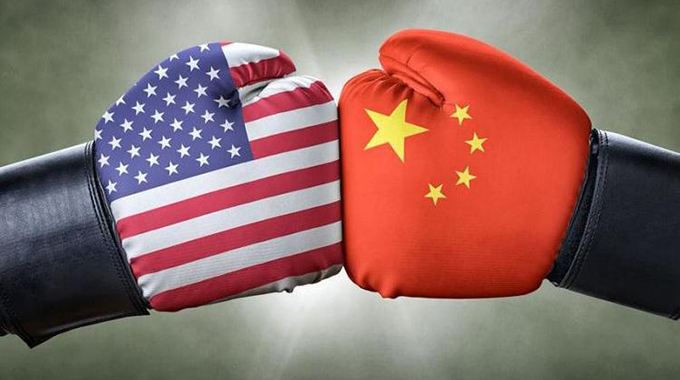US-China trade war: Is Africa ready to step in?

Lovemore Chikova Assistant Editor
With the trade war raging between the United States and China, the often asked question by development enthusiasts is: Is Africa ready to step in? There is no doubt that this devastating trade war will have a huge impact on the world stage, disrupting trade and economics in many ways.
In the case of Zimbabwe, the country has experienced the United States model of development, mainly characterised by neo-liberalism and the free market economy as evidenced in the prescriptions being advanced by institutions such as the International Monetary Fund.
This US-led type of development prescriptions come with political conditions that ensures countries viewed as not conforming to the West’s prescribed type of democracy are sidelined.
On the other hand, the Chinese model of development assistance comes with taglines of “win-win”, “mutual cooperation” and “common development”.
With the vast differences in ideological approaches between the West and the South, there is no doubt that Africa, Zimbabwe included, has of late become a contested sphere of developmental models from both sides.
Whatever the case, African countries should be able to find a niche in the ongoing trade battle between the United States and China.
The likely outcome of this trade war is that both the United States and China will start drifting more towards other areas like Africa in search of increased cooperation and more trade and investment.
It is imperative that African countries put their houses in order when it comes to attracting the potential investment and trade opportunities that are likely to come their way as a result of this fight.
One of the major impediments to attracting such foreign direct investment by African countries has been their uncoordinated investment policies.
There has been wide concern that the uncertainty that characterises the investment atmosphere in African countries has been a major set-back in terms of drawing much interest.
Investors are attracted by consistent policies that make countries provide a good haven for their funds.
With the escalating trade war between the United States and China, African countries are most likely to see more investors knocking on their doors in search of new opportunities.
The United States and China are the world’s two largest economies, with the United States leading the way, while China comes second.
In such circumstances, it is naturally expected that the two countries trade more between themselves as compared to their trade with other countries.
This means both are set to lose out when they start fights such as the one being witnessed in their devastating trade war.
Both China and the United States are now seeking to increase their stake in Africa as witnessed by events of the last few weeks.
The United States held the US-Africa Business Summit from June 18 to June 21 in Maputo, Mozambique, that was attended by various African leaders and business executives from both sides.
The summit brought together almost 1 000 United States and African private sector executives, international investors, senior government officials and multilateral stakeholders.
It created a platform for engagement between key players in Africa and the United States in areas such as agribusiness, energy, health, infrastructure, ICT and finance.
There was an exploration of business opportunities and meetings between potential business partners from Africa and the United States at the meeting.
US-Africa trade and investment policies also came under scrutiny at the summit.
In China, coordinators of the Forum on China-Africa Cooperation (FOCAC) from 53 African countries, including Zimbabwe, met in Beijing from Monday to Tuesday this week.
The coordinators were assessing progress made so far in implementing the proposals made at the FOCAC summit in Beijing last year.
The discussions centred on the implementation of provisions of FOCAC on trade, security and development.
Chinese President Xi Jinping availed US$60 billion to African countries at the FOCAC summit last year in a mix of grants, loans and special funds.
Chinese companies were also encouraged to make at least US$10 billion of investment in Africa up to 2021.
In a message send to the FOCAC coordinators meeting, President Xi said Chinese and African leaders had unanimously decided to push forward the Belt and Road Initiative and the African Union Agenda 2063.
He said they agreed to build a China-Africa community with a shared future that features joint responsibility, win-win cooperation, happiness for all, common cultural prosperity, common security and harmonious co-existence.
They agreed to jointly implement eight major initiatives of China-Africa cooperation, which charted a new blueprint for China-Africa relations on a higher level.
The eight initiatives are that China was to launch an industrial promotion initiative, an infrastructure connectivity initiative, a trade facilitation initiative, a green development initiative, a capacity building initiative, a healthcare initiative, a people-people exchange initiative and a peace and security initiative.
From the two recent summits, it is clear that investors from both the United States and China are interested in the same areas when it comes to Africa.
It is time African countries realise that despite the trade war, the funds will not come to the continent on a platter, which means working extra hard in creating a conducive environment to handle such proceeds.
In Zimbabwe, for example, the conditions that attract foreign direct investment have always been in place, but practically very few investors have ventured into the country.
The country has abundant natural resources, an educated population that can provide expert labour and good weather, among other endowments.
What has been lacking in Zimbabwe has been a conducive environment in terms of laws and regulations that can guide the country’s relationship with the foreign investors.
Foreign investors are profit-seeking institutions and individuals, who are mostly concerned with the financial benefits they will derive from their investments.
This applies to all foreign investors no matter where they come from.
African countries should start seeking to attract foreign direct investment by ensuring they come up with laws and regulations that make it comfortable for foreign investors to see the need to bring their money.
This should be done in a way that ensures that while the investors benefit, the country does not lose out, as the investment should contribute to the development of the recipient country.
It is important that the New Dispensation in Zimbabwe has come up with measures which ensures that foreign investors are comfortable to bring their funds to the country.
This is seen mainly through the establishment of the Zimbabwe Investment Development Agency that will guide the relationship between the investors and the country.
Appropriate incentives such as tax breaks and holidays, attractive tariffs and funds repatriation are some of the issues that foreign investors are concerned about, and are being addressed by the new investment institution.
Even with the escalating trade war between China and the United States seemingly giving an advantage to other countries like Zimbabwe, the benefits will not accrue if the conditions to attract such investments are not in place.
There are reports that China, the world’s biggest buyer of soya beans, has stopped purchasing the crop from the United States as part of retaliating in the two countries’ trade war.
This was after the Trump administration had raised tariffs on US$250 billion of Chinese goods.
The ban on soya beans importation from the United States by China inevitably creates an opportunity for countries like Zimbabwe to step in to lure agricultural investors from the Asian country.
The fact that China has stopped importing soya beans from the United States does not mean that the country no longer consumes the crop.
The demand of the crop is still the same in China, which means the Asian country has to find an alternative market to acquire the soya beans.
With conducive regulations on foreign investors, Zimbabwe can easily attract Chinese firms and partner with them to produce soya beans for the market in the Asian country, thereby filling the gap created by the trade war.
But the country should be adequately marketed as a potential destination for such foreign direct investment to ensure that the potential investors are well informed.
It is clear that both China and the United States are increasingly seeking to expand their trade with African countries to reduce the risks they face in light of their trade war.
For instance, in recent months, China has imported more crude oil from Angola and other countries in a bid to compensate for the declining imports of natural gas from the United States caused by the trade war.
It is possible that in the near future, China’s imports will come from Africa more than anywhere else, while it also exports more to the continent as it succumbs to the burden of the trade war.
For African countries like Zimbabwe, it is time to move away from being bystanders and get actively involved in the attraction of capital that is seeking a home to settle.
While doing so, there is need to guard against the dumping of cheap products that end up stifling the local industry and derailing the industrialisation and modernisation agenda.








Comments